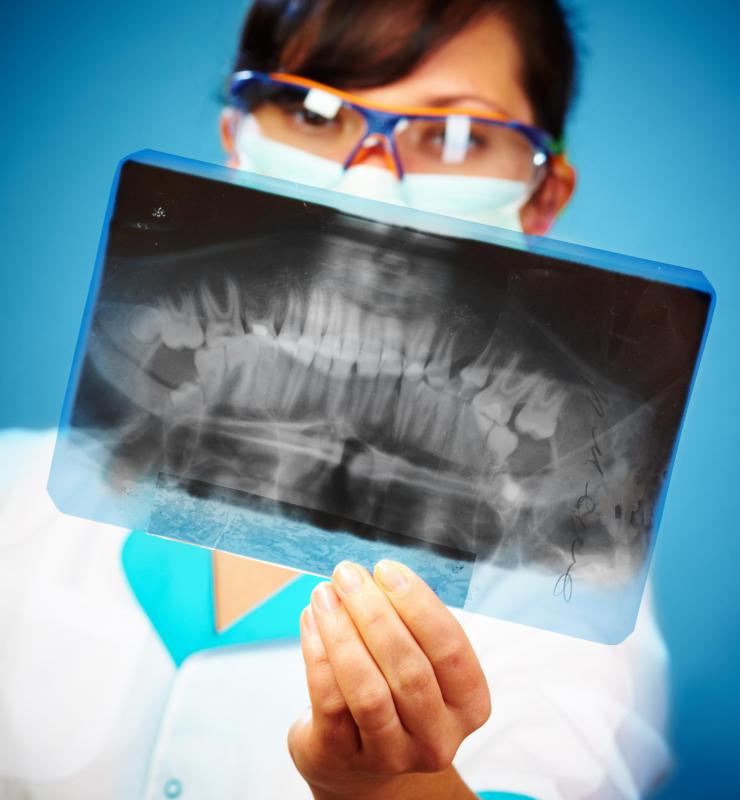At WiseGEEK, we're committed to delivering accurate, trustworthy information. Our expert-authored content is rigorously fact-checked and sourced from credible authorities. Discover how we uphold the highest standards in providing you with reliable knowledge.
What Is a Pulp Test?
A pulp test is a type of dental procedure. Its main function lies in tooth health assessment. Specifically, the dentist places a device on the tooth that sends an electric, heat, or cold current. The degree to which this current produces a response in the tooth can evaluate potential damage within the tooth. These tests can validate the need for dental interventions like root canals or tooth removal.
The dental pulp test measures the health of a tooth’s pulp. Several nerves and blood vessels reside in each tooth, providing sustenance and feeling. The pulp’s connective tissue retains these components. Therefore, the substance is perhaps the best indicator of a tooth’s overall health. If the pulp is damaged, then the entire tooth faces danger.

The goal of a dental pulp test is to induce sensations in a tooth suspected of degeneration. Sensations may take the form of buzzing or clicking. The responses are produced via an electrically charged current that runs through the tooth. Variations of the sensation-based pulp test exist that alternatively measure a tooth’s inner blood flow.
A device called a pulp tester controls the current’s intensity. Although testers generally emit electricity, they may also produce other sensation-measuring approaches like heat and cold. The physician might use more general substances to perform a pulp test as well, ranging from ice sticks to hot drinks. Before applying the tester to the tooth, a small amount of conducting paste is first applied upon the tooth.

Surrounding teeth are also measured with a tester to serve as a comparative template of sorts. Irregularities in the pulp test usually indicate nerve damage and chronic infectious processes that may put the patient’s overall health at risk. When the focal tooth produces a sensation that contrasts with surrounding teeth, this response usually indicates tooth nerve damage. If the sensation occurs significantly earlier than it does in the other teeth, then pulpitis, or inflammation of the tooth pulp, is a likely culprit. No sensations at all, on the other hand, might indicate a severe abscess infection or even death of the pulp tissue: a condition known as dental pulp necrosis.

Two primary treatment protocols follow an abnormal pulp test result. The dentist might perform a root canal, in which he or she removes the afflicted nerves and vessels from the tooth pulp. Following this removal, the pulp is then cleaned, filled with a cement substance, and capped. If the tooth is extremely damaged and deemed beyond repair, then the dentist may extract the tooth.
AS FEATURED ON:
AS FEATURED ON:


















Discussion Comments
I have a friend who had an abscess, and she was in a lot of pain. Her mouth was swollen. When she went to the dentist, the dentist told him that he couldn't be certain that there was nerve damage around the tooth, but that was a possibility.
Now this has been some years ago, and I don't think there was a pulp test at the time. Anyway, this dentist didn't say anything about it. If the test had been available then maybe he could have known more about what was going on.
Anyway, my friend told him to pull the tooth. She didn't want to take the chance that the thing might continue to give her problems down the road.
@Drentel - Yes, there are some dentists who will go a bit overboard with their recommendations for oral surgery, but I don't think this is true for the large majority of dentists. And if you think your dentist would put making money ahead of your health and recommend costly procedures then you should probably find a new dentist.
I appreciate my dentist and I go regularly, but I have to admit that I have a distrust of dentists in general. Have you read about all of the unnecessary procedures dentists and oral surgeons do every year? Root canals are one of the most commonly over used procedures.
The bad part about this is that the patient isn't really in a position to tell his dentist that he doesn't need the root canal. How is the average person going to know whether his toothache is caused by something simple or something that requires surgery?
I've never had a pulp test, but hopefully this test will allow patients to see what is actually going on with their teeth, and not have to totally depend on the judgment of the dentist.
Post your comments